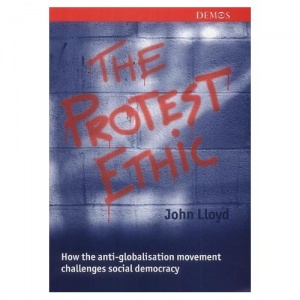Difference between revisions of "John Lloyd"
('Lobbying hard for war') |
|||
| Line 1: | Line 1: | ||
[[Image:John Lloyd.jpg|right|thumb|John Lloyd]] | [[Image:John Lloyd.jpg|right|thumb|John Lloyd]] | ||
'''John Nicol Fortune Lloyd''' (born 15 April 1946) is a British journalist who for most of his career has been associated with the ''Financial Times'', but who has also written for and at one time edited the ''[[New Statesman]]''. He identifies himself as a liberal but is a prominent pro-war activist. He left the ''News Statesman'' in 2003 after being dubbed the magazine’s “house reactionary” by one of his colleagues.<ref>John Lloyd, [http://www.newstatesman.com/200304140009 Why I can no longer write for the NS], New Statesman 14 April 2003.</ref> | '''John Nicol Fortune Lloyd''' (born 15 April 1946) is a British journalist who for most of his career has been associated with the ''Financial Times'', but who has also written for and at one time edited the ''[[New Statesman]]''. He identifies himself as a liberal but is a prominent pro-war activist. He left the ''News Statesman'' in 2003 after being dubbed the magazine’s “house reactionary” by one of his colleagues.<ref>John Lloyd, [http://www.newstatesman.com/200304140009 Why I can no longer write for the NS], New Statesman 14 April 2003.</ref> | ||
| + | |||
| + | =='Lobbying hard for war'== | ||
| + | In February 2003, the ''Independent'' columnist [[Johann Hari]] (who has since apologised for his pro-war stance <ref>Johann Hari, [http://www.johannhari.com/archive/article.php?id=831 After three years, after 150,000 dead, why I was wrong about Iraq], JohannHari.com, 18 March 2006</ref>) identified Lloyd as one of a group of centre-left figures 'lobbying hard' for the US/UK invasion of Iraq: | ||
| + | |||
| + | <blockquote style="background-color:ivory;border:1pt solid Darkgoldenrod;padding:1%;font-size:10pt">A year ago, the proposals for a second Gulf War seemed very much the brainchild of the American right. The intellectual arguments backing the conflict emerged almost entirely from hard-right US think-tanks and senators. But then, a funny thing happened: a significant portion of the dissident left began to come out, in dribs and drabs, for overthrowing Saddam by force. There is now a considerable school of British centre-left thinkers and commentators who are lobbying hard for war, so that the Iraqi people can be freed: [[Christopher Hitchens]], [[Nick Cohen]], John Lloyd, [[Julie Burchill]], [[Roger Alton]] and [[David Aaronovitch]].<ref>Johann Hari, ‘[http://www.independent.co.uk/news/media/whose-side-are-you-on-598732.html Whose side are you on?]’, ''Independent'', 25 February 2003</ref></blockquote> | ||
==Affiliations== | ==Affiliations== | ||
Revision as of 11:16, 22 September 2009
John Nicol Fortune Lloyd (born 15 April 1946) is a British journalist who for most of his career has been associated with the Financial Times, but who has also written for and at one time edited the New Statesman. He identifies himself as a liberal but is a prominent pro-war activist. He left the News Statesman in 2003 after being dubbed the magazine’s “house reactionary” by one of his colleagues.[1]
'Lobbying hard for war'
In February 2003, the Independent columnist Johann Hari (who has since apologised for his pro-war stance [2]) identified Lloyd as one of a group of centre-left figures 'lobbying hard' for the US/UK invasion of Iraq:
A year ago, the proposals for a second Gulf War seemed very much the brainchild of the American right. The intellectual arguments backing the conflict emerged almost entirely from hard-right US think-tanks and senators. But then, a funny thing happened: a significant portion of the dissident left began to come out, in dribs and drabs, for overthrowing Saddam by force. There is now a considerable school of British centre-left thinkers and commentators who are lobbying hard for war, so that the Iraqi people can be freed: Christopher Hitchens, Nick Cohen, John Lloyd, Julie Burchill, Roger Alton and David Aaronovitch.[3]
Affiliations
- East-West Institute
- Demos
- Foreign Policy Centre
- Reuters Institute for the Study of Journalism
- Polis, adviser
- Campaign for Press Freedom, 1980
- Euston Manifesto, signatory
- Prospect Magazine, board member
- Moscow School of Political Studies
Books
- Charles Leadbeater, John Lloyd, In search of work (Penguin Books Ltd 1987) ISBN 0140227733; 9780140227734
- Martin Adeney, John Lloyd, The miners' strike, 1984-85: Loss Without Limit (Routledge, 1988) ISBN 0710213719; 9780710213716
- Charles Leadbeater, John Lloyd,
- John Lloyd, Rebirth of a nation: an anatomy of Russia (London : M. Joseph, 1998) ISBN 0718138627; 9780718138622
- John Lloyd, Re-engaging Russia (Foreign Policy Centre, 2000) ISBN 0953559866 9780953559862
- John Lloyd, The protest ethic: how the anti-globalisation movement challenges social democracy (London: Demos, 2001) ISBN 1841800090 9781841800097
- John Lloyd, What the media are doing to our politics (London: Constable, 2004)
ISBN 1841199001; 9781841199009
Resources
- Neocon Europe John Lloyd
Notes
- ↑ John Lloyd, Why I can no longer write for the NS, New Statesman 14 April 2003.
- ↑ Johann Hari, After three years, after 150,000 dead, why I was wrong about Iraq, JohannHari.com, 18 March 2006
- ↑ Johann Hari, ‘Whose side are you on?’, Independent, 25 February 2003

